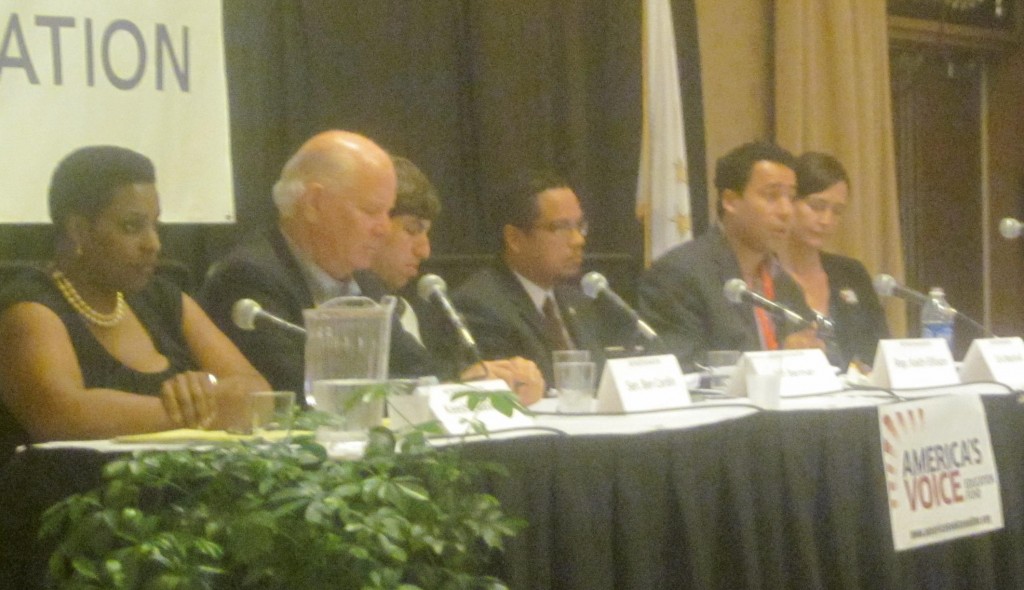Voter fraud or voter suppression: right and left clash over election laws

Netroots Nation panel on voting, from left: Keesha Gaskins, Sen. Ben Cardin, Ari Berman, Rep. Keith Ellison, Eric Marshall, Heather Smith
By Len Lazarick
[email protected]
PROVIDENCE, R.I. – The right and the left agree on a few things about current trends in voting laws: democracy is being threatened by a desire to win elections and wield power.
But at panels a mile apart this weekend, the two sides presented very different views of the state of election practices. The right sees widespread electoral fraud that needs to be stopped with tougher laws to prevent stolen elections, and the left sees this as a massive effort at voter suppression to steal elections.
“These laws are the new Jim Crow laws of our times,” said Maryland U.S. Sen. Ben Cardin on a panel about “The War on Voting” at Netroots Nation, a large conference of progressive activists. “This is really an effort to control the outcome of elections” and not protect “the integrity of our electoral system.”
Vote fraud: real or myth
A mile away at a conference on journalism sponsored by the Heritage Foundation and the Franklin Center for Government and Public Integrity, Wall Street Journal columnist John Fund tried to counter “this myth that voter fraud does not exist.”
If an election “is perceived as close, someone will try to steal it,” Fund said.
“Vote fraud is real and vote fraud swings elections,” said Quinn Hillyer of the Center for Individual Freedom. “This isn’t a racial thing. This is an anyway-we-can-win thing.”
Between the two competing panel discussions stood the Rhode Island statehouse, where the legislature passed a voter ID law last year, the only state controlled by Democrats to pass such a law. Hispanic and African American legislators voted for the bill.
38 states introduce election controls
War on Voting moderator Ari Berman of the Nation said 38 states have recently introduced legislation “to impede voting.” (This list would include Maryland where Republican lawmakers have repeatedly sponsored bills to require voters to present positive identification, but none of the bills have made it out of committee.)
The restrictive laws cited by progressives include not just voter ID but laws that make it harder to register by requiring birth certificates, proof of citizenship, or banning election-day registration — a practice not permitted in Maryland.
Fund has made electoral fraud a preoccupation since his 2004 book “Stealing Elections.” He cited numerous examples of alleged fraud, including the 2008 Minnesota Senate election won by Al Franken by 317 votes after repeated recounts. Fund says over 1200 convicted felons may have voted in that election, and 197 have since been convicted of voter fraud.
But Eric Marshall of 1-866-OURVOTE said, “The lack of proof [of voter fraud] is just incredible.”
Racial element
Rep. Keith Ellison, a Minnesota Democrat, said, the push for voter ID and other restrictions are pushback over the election of Barack Obama.
“This is about power – we got some, and they want to take it back,” Ellison said. “This is not about fraud.”
The progressive panel saw the move to voter ID in racial terms. Berman said 10% of voters don’t have identification, including 25% of African American voters. CORRECTION: Keesha Gaskins of the Brennan Center for Justice said voter suppression laws passed in seven of the 10 states with the highest African-American turnout. the push for voter ID has come mostly in states with high African American populations (One was vetoed.)
But Fund, who describes voter fraud as largely an urban problem, said “racist” is “their swear word.”
With this year’s presidential election seen as close, both sides of the issues say they will be on guard, the right looking for more voter fraud, the left for attempted voter suppression using voter fraud they say is rare to justify new restrictions.
Cardin said the new efforts at voter suppression “call into question our free and fair elections. It’s a stain on our democracy.”

MarylandReporter.com is a daily news website produced by journalists committed to making state government as open, transparent, accountable and responsive as possible – in deed, not just in promise. We believe the people who pay for this government are entitled to have their money spent in an efficient and effective way, and that they are entitled to keep as much of their hard-earned dollars as they possibly can.
